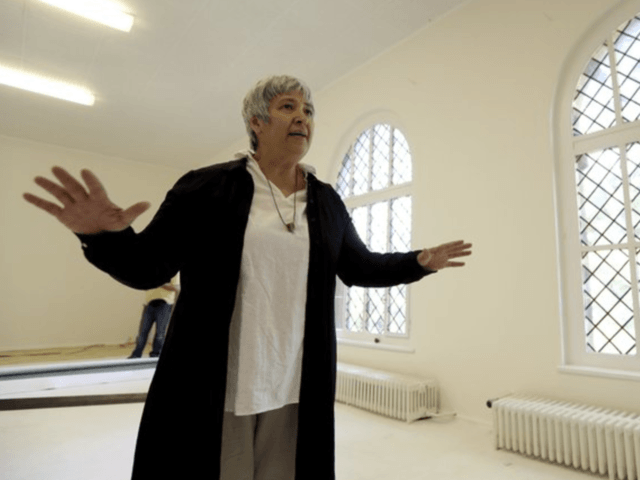BERLIN (AP) — Seyran Ates’ vision of a liberal mosque where all Muslims can pray together — women and men, Sunni and Shiite, straight and gay — is almost a reality, and the 54-year-old daughter of Turkish guest workers in Germany is ecstatic as she enters the light-flooded room undergoing its final touches.
“I couldn’t be more euphoric, it’s a dream come true,” Ates said with a smile as she touched the white carpet that three Turkish workers were laying out in the freshly painted room.
Ates, a well-known women’s rights activist and lawyer, has fought for eight years to establish a place of prayer for progressive Muslims in Germany where they can leave their religious conflicts behind and focus on their shared Islamic values. The mosque, which opens Friday, will be the first of its kind for liberal Muslims in Germany, Ates said.
“This project was long overdue,” she said during an interview with The Associated Press this week. “There’s so much Islamist terror and so much evilness happening in the name of my religion … it’s important that we, the modern and liberal Muslims, also show our faces in public.”
The mosque is named Ibn-Rushd-Goethe-Mosque, combining the names of medieval Andalusian philosopher Ibn Rushd and German writer Johann Wolfgang Goethe. It is located on a busy shopping street in the immigrant neighborhood of Moabit, which is dotted with Indian and Vietnamese restaurants and Middle Eastern cafes.
Visitors looking for a minaret or trying to follow the call of the muezzin will be searching in vain. The mosque occupies a big room on the third floor of an old Lutheran church.
“To get started, we’ve rented this room for one year,” Ates said.
More than 4 million Muslims live in Germany, the majority from Turkey but also from the Balkans, the Middle East and Northern Africa.
Most started coming to Germany in the 1960s as workers to help rebuild the economy after World War II. While it was Germany’s intention to send them home after a few years, many stayed and brought over their families. More recently, Germany has taken in more than 1 million refugees since 2015, most of them Muslims from war-torn countries like Syria, Iraq and Afghanistan.
Relations between the country’s majority Christian population and the Muslim minority traditionally have been complicated. They have been strained by several terror attacks in Germany by Muslims in the name of the extremist Islamic State group. Raids on, and bans of, radical Muslim associations and arrests of extremist suspects have become commonplace.
Ates said the new mosque will be a place of liberalism where everyone is welcome and equal. Women don’t have to wear headscarves, can preach as imams and call the faithful to prayer just like men.
“There won’t be any hate preaching against democracy here,” Ates said. Instead, followers can express doubt about their beliefs and approach their religion with sense and reason instead of blind devotion, she said.
Ates, who was shot and almost died while working as a counselor for Turkish women in 1984 and was attacked by an enraged husband, waved aside any potential worries about threats or criticism from more conservative Muslims.
“I’ve received a few messages via social media, mostly full of expletives,” she said. “But 95 percent of the feedback has been beautiful and positive.”
Turks, Kurds and Arabs alike have donated money, businesspeople have called to offer help with creating signage and advertisements and several Middle Eastern restaurants will deliver free food for the iftar, the breaking of the Ramadan fast on Friday night, she said.
Ates’ sister brought 30 green prayer rugs from Istanbul a few weeks ago, and an Indonesian interior architect has offered her services to refurbish the 90-square-meter (970-square-foot) room.
For the future, she and colleagues dream of building a real mosque with several prayer rooms for believers of all the different Islamic sects as well as an academy devoted to the education of liberal imams, male and female.
Ates herself will preach at the opening ceremony on Friday.
“I will start studying Islamic theology and Arabic in Berlin this fall,” she said. “I want to become an imam myself.”

COMMENTS
Please let us know if you're having issues with commenting.